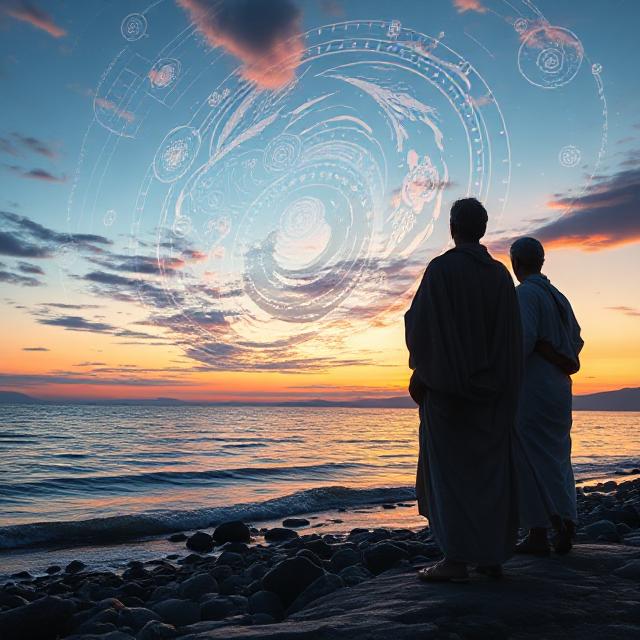
Table of Contents
What Did the Pre-Socratics Actually Believe?
Introduction: Who Were the Pre-Socratics?
Before Socrates changed the direction of Western philosophy with his ethical inquiries, a diverse group of thinkers was already asking fundamental questions about the nature of reality, change, and existence.
Known collectively as the Pre-Socratics, these thinkers lived roughly between 600–400 BCE in ancient Ionia, Magna Graecia (southern Italy), and the Aegean islands. Although their writings survive only in fragments, their influence was monumental—they laid the foundation for science, metaphysics, and cosmology.
So what did these early philosophers actually believe? Let’s explore their core ideas.
I. Thales of Miletus: Everything Is Water
- Thales (c. 624–546 BCE) is often regarded as the first philosopher in the Western tradition.
- He proposed that the arche (first principle or origin) of all things is water.
- Why water? Thales observed that all life depends on moisture and that water can take many forms: solid, liquid, vapor.
Key Belief: All things emerge from water, and the world operates by natural laws, not myths.
II. Anaximander: The Boundless (Apeiron)
- A student of Thales, Anaximander rejected water as the ultimate substance.
- He proposed the apeiron—a boundless, indefinite principle beyond the observable world.
- From the apeiron emerge opposites (hot/cold, wet/dry) which generate the cosmos.
Key Belief: Reality originates from an undefined, infinite principle rather than any known substance.
III. Anaximenes: All Is Air
- Anaximenes brought the arche back to a tangible element: air.
- He believed everything comes from air through processes of condensation (making things denser) and rarefaction (making them lighter).
- For example, compressed air becomes water, then earth; expanded air becomes fire.
Key Belief: A single substance (air) underlies all things and changes form through physical processes.
IV. Heraclitus: Everything Flows
- Heraclitus of Ephesus is famous for the phrase: “You cannot step into the same river twice.”
- He believed that reality is constant flux—everything is always changing.
- Fire was his symbol for this eternal transformation.
- Central to his thought was the Logos—a rational principle or order behind change.
Key Belief: The universe is in constant motion, yet governed by a unifying logic (Logos).
V. Pythagoras: Number as the Essence of Reality
- Pythagoras is often remembered for his mathematical theorem, but he also founded a philosophical-religious movement.
- He believed that number was the underlying principle of all reality.
- Harmony, proportion, and mathematical ratios explained music, the cosmos, and even the soul.
Key Belief: Mathematical structure is the true nature of the cosmos, and the soul is immortal and undergoes rebirth.
VI. Parmenides: All Is One, Change Is Illusion
- Parmenides argued that change is impossible and reality is one, unchanging, eternal being.
- He denied the existence of “nothing” and thus claimed that coming-into-being is illogical.
- Sense experience, he said, is deceptive—only reason reveals truth.
Key Belief: Being is unchanging and indivisible; what we perceive as change is illusion.
VII. Zeno of Elea: Defender of Parmenides
- A student of Parmenides, Zeno created paradoxes (like Achilles and the Tortoise) to defend the idea that motion is illusory.
- His arguments challenged basic assumptions about space, time, and divisibility.
Key Belief: Logical paradoxes reveal the impossibility of motion, reinforcing the idea that reality must be changeless.
VIII. Empedocles: The Four Elements
- Empedocles proposed that all matter is composed of four root elements: earth, air, fire, and water.
- He added two forces: Love (which unites) and Strife (which separates).
- The cosmos cycles through phases dominated by these forces.
Key Belief: The world results from the mixing and separating of basic elements by opposing forces.
IX. Anaxagoras: Infinite Seeds and Mind (Nous)
- Anaxagoras introduced the idea of “seeds” (spermata)—tiny parts of all substances that combine in varying ratios.
- He also introduced Nous (Mind) as the organizing force of the cosmos.
- Nous is not material but initiates motion and order.
Key Belief: Everything contains everything, but it is Mind that arranges the cosmos.
X. Democritus and Leucippus: Atomism
- These thinkers proposed that everything is composed of indivisible atoms moving through the void.
- Atoms differ in shape, size, and arrangement, but not in quality.
- This was a mechanical and materialist view of the world, foreshadowing modern science.
Key Belief: Reality is made of atoms and empty space—there is no need for divine explanation.
Why Were the Pre-Socratics Important?
- They moved philosophy away from myth and poetry, toward reason and observation.
- They posed the first metaphysical and scientific questions in Western history.
- They developed early ideas of cosmology, substance, ethics, and logic.
- Their legacy shaped Socrates, Plato, and Aristotle—and by extension, the entire Western tradition.
Common Themes in Pre-Socratic Thought
| Theme | Explanation |
|---|---|
| Arche | Search for the first principle of all things |
| Change vs Permanence | Is the universe in flux or fixed? |
| Rational Explanation | Replacing myth with reason |
| Unity vs Plurality | Is reality one or many? |
| Nature (Physis) | Understanding the world through nature, not gods |
TL;DR Summary
- Pre-Socratics were the first philosophers in the West, active before Socrates.
- They searched for the first principles of existence: water, air, fire, the infinite, numbers, atoms.
- Some emphasized change (Heraclitus), others denied it (Parmenides).
- They laid the groundwork for science, logic, and metaphysics.
- Their legacy still shapes philosophical inquiry today.
Final Reflection: Why Their Questions Still Matter
The Pre-Socratics asked questions that remain relevant today:
- What is the universe made of?
- Can we trust our senses?
- Is change real, or just appearance?
- Is there a rational order to the cosmos?
Even now, as physics, cosmology, and AI push the boundaries of our understanding, we return to the same root questions. The Pre-Socratics remind us that philosophy begins not with answers—but with the courage to ask.
